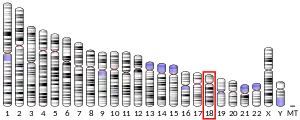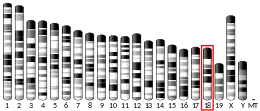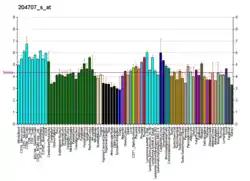MAPK4
Mitogen-activated protein kinase 4 is an enzyme that in humans is encoded by the MAPK4 gene.[5][6]
Mitogen-activated protein kinase 4 is a member of the mitogen-activated protein kinase family. Tyrosine kinase growth factor receptors activate mitogen-activated protein kinases which then translocate into the nucleus where it phosphorylates nuclear targets.[6]
The Arabidopsis MAPK4 is important in signalling [7]
Mechanistically, MAPK4 directly bound and activated AKT by phosphorylation of the activation loop at threonine 308. It also activated mTORC2 to phosphorylate AKT at serine 473 for full activation. MAPK4 overexpression induced oncogenic outcomes, including transforming prostate epithelial cells into anchorage-independent growth, and MAPK4 knockdown inhibited cancer cell proliferation, anchorage-independent growth, and xenograft growth.[8]
References
- ENSG00000282110 GRCh38: Ensembl release 89: ENSG00000141639, ENSG00000282110 - Ensembl, May 2017
- GRCm38: Ensembl release 89: ENSMUSG00000024558 - Ensembl, May 2017
- "Human PubMed Reference:". National Center for Biotechnology Information, U.S. National Library of Medicine.
- "Mouse PubMed Reference:". National Center for Biotechnology Information, U.S. National Library of Medicine.
- Li L, Wysk M, Gonzalez FA, Davis RJ (February 1994). "Genomic loci of human mitogen-activated protein kinases". Oncogene. 9 (2): 647–9. PMID 8290275.
- "Entrez Gene: MAPK4 mitogen-activated protein kinase 4".
- Petersen M, Brodersen P, Naested H, Andreasson E, Lindhart U, Johansen B, et al. (December 2000). "Arabidopsis map kinase 4 negatively regulates systemic acquired resistance". Cell. 103 (7): 1111–20. doi:10.1016/S0092-8674(00)00213-0. PMID 11163186. S2CID 1864451.
- Wang W, Shen T, Dong B, Creighton CJ, Meng Y, Zhou W, et al. (March 2019). "MAPK4 overexpression promotes tumor progression via noncanonical activation of AKT/mTOR signaling". The Journal of Clinical Investigation. 129 (3): 1015–1029. doi:10.1172/JCI97712. PMC 6391107. PMID 30688659.
Further reading
- Seger R, Krebs EG (June 1995). "The MAPK signaling cascade". FASEB Journal. 9 (9): 726–35. doi:10.1096/fasebj.9.9.7601337. PMID 7601337. S2CID 23298305.
- Davis RJ (December 1995). "Transcriptional regulation by MAP kinases". Molecular Reproduction and Development. 42 (4): 459–67. doi:10.1002/mrd.1080420414. PMID 8607977. S2CID 12842112.
- Robinson MJ, Cobb MH (April 1997). "Mitogen-activated protein kinase pathways". Current Opinion in Cell Biology. 9 (2): 180–6. doi:10.1016/S0955-0674(97)80061-0. PMID 9069255.
- Gonzalez FA, Raden DL, Rigby MR, Davis RJ (June 1992). "Heterogeneous expression of four MAP kinase isoforms in human tissues". FEBS Letters. 304 (2–3): 170–8. doi:10.1016/0014-5793(92)80612-K. PMID 1319925. S2CID 42548392.
- Zhu AX, Zhao Y, Moller DE, Flier JS (December 1994). "Cloning and characterization of p97MAPK, a novel human homolog of rat ERK-3". Molecular and Cellular Biology. 14 (12): 8202–11. doi:10.1128/mcb.14.12.8202. PMC 359359. PMID 7969157.
- Kinet S, Bernard F, Mongellaz C, Perreau M, Goldman FD, Taylor N (October 2002). "gp120-mediated induction of the MAPK cascade is dependent on the activation state of CD4(+) lymphocytes". Blood. 100 (7): 2546–53. doi:10.1182/blood-2002-03-0819. PMID 12239168.
- Sun M, Wei Y, Yao L, Xie J, Chen X, Wang H, et al. (February 2006). "Identification of extracellular signal-regulated kinase 3 as a new interaction partner of cyclin D3". Biochemical and Biophysical Research Communications. 340 (1): 209–14. doi:10.1016/j.bbrc.2005.12.003. PMID 16360641.
- Kant S, Schumacher S, Singh MK, Kispert A, Kotlyarov A, Gaestel M (November 2006). "Characterization of the atypical MAPK ERK4 and its activation of the MAPK-activated protein kinase MK5". The Journal of Biological Chemistry. 281 (46): 35511–9. doi:10.1074/jbc.M606693200. PMID 16973613.





